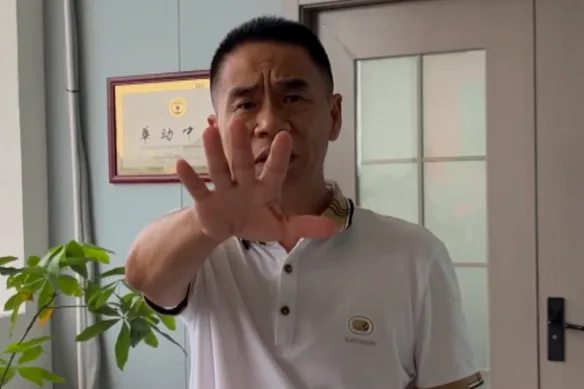An elite Fijian police taskforce working with Australia and New Zealand to fight surging drug trafficking and organised crime in the Pacific region is suspected to have been secretly compromised by a powerful criminal syndicate.
Australian security officials’ concerns that members of the Fijian police commissioner’s illicit drug taskforce have been working for the Zhao syndicate are detailed in police files seen by this masthead and briefings provided by officials in Suva.
The revelations highlight the challenge Canberra faces responding to major security threats in the South Pacific, spanning corruption and organised crime amid an intensifying geopolitical contest with Beijing for influence.
Three Australian government officials, speaking anonymously to discuss confidential information, confirmed the Albanese government was poised to announce a major increase in security aid across the South Pacific, but was concerned it would be complicated if there were questions over corruption.
Pio Tikoduadua, the Home Affairs minister in Sitiveni Rabuka’s Fijian government that was elected in 2022, conceded some Fijian police officers appeared to be aiding regional drug traffickers targeting Australia.
“I think it’s pointing that way. And I’m trying to do something about it right now. I’d be lying if I’m not concerned about our Fiji police force,” Tikoduadua said in a recent interview with this masthead.
Rabuka separately warned of “rogue elements” in Fiji’s police force.
“We just have to be very aware of them and make sure that the non-rogue ones, the genuine ones … are more awake than those that might want to get up to mischief,” the prime minister told this masthead.
The security briefings seen by this masthead show high-ranking Australian and Fijian police believe that by about early 2021, key members of the Zhao syndicate had cultivated members of an elite counter-narcotics taskforce created by Fiji’s police commissioner, Brigadier General Sitiveni Qiliho.
The Zhao syndicate comprises a network of criminals and facilitators spanning the South Pacific and is allegedly led by Zhao Fugang, a powerful Fijian businessman and Chinese Communist Party operative.
Last month, this masthead and 60 Minutes revealed that Western agencies secretly considered Zhao an alleged crime boss even as he spent years gathering business and political influence in Suva.
Zhao was designated one of Australia’s highest-priority criminal targets in July 2023. Zhao has denied any wrongdoing and there is no suggestion by this masthead that he is guilty of any offence, only that Australian agencies have listed him as a high-level criminal threat.
Experts said Zhao’s designation as a major Australian police target was especially significant in light of the businessman’s extensive work to build Chinese Communist Party influence in Fiji, which has included strengthening formal ties between Chinese and Fijian police.
According to the official briefing papers, corrupt officers in the Fijian police commissioner’s illicit drug taskforce allegedly helped the Zhao syndicate as it managed drugs passing through Fiji, and helped connect supply hubs to drug markets in Australia and New Zealand.
The taskforce was meant to be supporting the Transnational Serious Organised Crime Pacific Taskforce, an initiative launched by the Australian Federal Police in 2019 and which partners the AFP with police in New Zealand, Fiji and Tonga.
Qiliho was suspended as Fiji’s police chief and charged alongside former prime minister Frank Bainimarama over unrelated corruption allegations in 2023. Earlier this month, Qiliho was found guilty of abusing his public office and fined FJD$1500 (US$750) without conviction. Prosecutors immediately appealed against that decision.
Further charges, which Qiliho and Bainimarama both contest, are still before the Fijian courts.
There is no suggestion Qiliho was personally compromised by the Zhao syndicate, although he has a personal relationship with Zhao and they use the same lawyer. Qiliho did not respond to questions.
The intelligence collected by security agencies in Australia and Fiji identifies a taskforce official as the intermediary for the Zhao syndicate and responsible for directing a small clique of other police investigators to do the syndicate’s bidding.
This police officer is suspected of liaising with two senior members of the Zhao syndicate, Chinese crime figure Lum Bing and Fijian national Jason Zhong, who are linked to a message sent in early 2021 to the policeman via an encrypted messaging application.
The message stated: “See if you can do as much as possible, from a few dozen to hundreds to thousands. You can make money or a cut.”
Lum is a British national who moves across the Asia-Pacific region and has been arrested repeatedly over the past three decades for serious organised criminal offences, including running a network of industrial-scale drug labs in 2004.
Zhong was convicted in 2004 in connection to what was at the time Fiji’s biggest drug operation, and was later convicted for sex trafficking. He has reinvented himself in Fiji as a businessman who, like Zhao Fugang, has deep connections to the nation’s political elite.
Lum and Zhong could not be contacted.
The allegedly corrupt police officer is suspected to have co-ordinated other Fijian police to carry out tasks for the Zhao syndicate.
Official sources said those tasks included storing large amounts of drugs in Fiji, co-opting local criminals to help the syndicate and arranging the sale of drugs to outlaw motorcycle gangs in Australia or New Zealand.
The revelation the Zhao syndicate is suspected of infiltrating Fiji’s most elite police taskforce will place further pressure on the Rabuka government, which was forced to respond to the reports of Zhao’s designation as an Australian Priority Organisation Target.
Zhao’s designation, including for his role developing Chinese political interests in Fiji, also sparked a fierce reaction from China’s Foreign Affairs Ministry, which labelled the allegations “fake news”.
Australian policing agencies have listed Zhao as an Australian Priority Organisation Target over allegations he was seeking “to influence the [South Pacific] environment to provide cover for Chinese organised crime” and provide “a Fijian ‘safe hub’ for drug shipments” bound for Australia.














